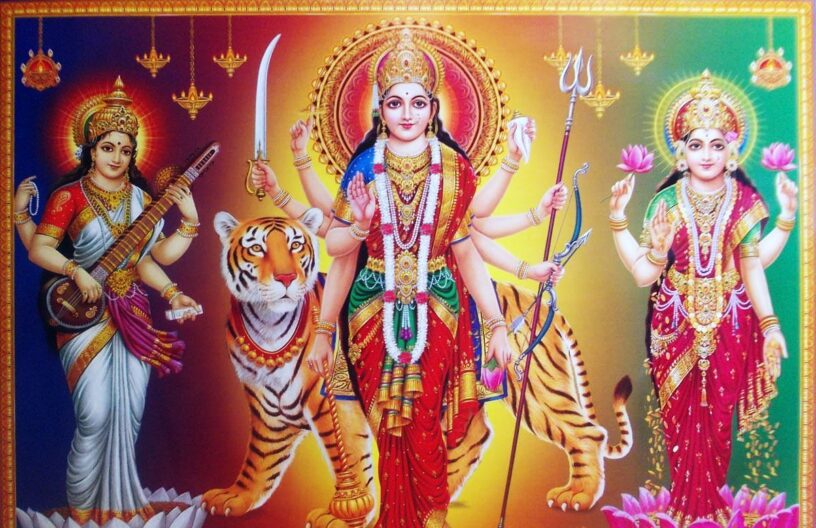Devi is power or energy in both its static and dynamic forms. It is that force that guides the creation, sustenance, destruction and re-absorption of all life. Every action, every thought, every word is governed by this power. Everyone possesses five shaktis or forms of energy at various states of awareness. These forms are:
- Chid Shakti: Energy of Consciousness
2. Aanand Shakti: Energy of Bliss
3. Ichha Shakti: Energy of Will
4. Gyaan Shakti: Energy of Knowledge
5. Kriyaa Shakti: Energy of Action
Why worship Devi?
The Divine Mother, Devi symbolises the higher self, the state of positive qualities, purity, awareness and spirituality .She is representative of ‘chid shakti’.
As Durgaa Devi, she is portrayed as sitting upon the tiger, which is symbolic of the lower self. This state is indicative of negative qualities eg. lust, greed, and anger. The individual who possesses such qualities is consumed by materialism and identifies with a world of objectivity, where everything is perceived by the mind and senses only. The individual ego asserts its dominance under such conditions. It is the state of ‘maayaa shakti’ or power of illusion.
The worship of Devi brings about a greater awareness of the forms of energy. It is an attempt to bring the aspirant to a state of ‘chid shakti’-from illusion to consciousness. Negative tendencies are brought under control. Positive qualities such as compassion, truthfulness, forgiveness, non-aggression, etc. replace the animalistic and materialistic qualities. One focuses on subjectivity. The individual ego is transformed to the ego of consciousness and the spiritual aspirant is drawn closer to experiencing the truth of the dictum: ‘Aham Brahm Asmi’- the Lord and I are one.
Why Is The Coconut Used In Devi Poojaa?
One of the features of Durgaa Poojaa is the burning of an unhusked dried coconut. This burning is quite symbolic and is a representation of final purification. The fibers of the coconut represent the ‘vaasanas’ , desires and lower tendencies in man and such a destruction draws him to a more purified state of existence. The coconut itself, referred to as “karma-phal” (the fruit of all actions) symbolizes one’s “karma”.Action performed with some desire, places man in the apparent unceasing cycle of birth and death where he continuously dies and is re-born. By burning a coconut, in poojaa, one’s desires and actions are symbolically burnt and man is freed from the bondage of “karma”, thus ending the birth/rebirth cycle. He is then qualified to attain “moksha” or liberation. Why burn the coconut only in poojaa? Durgaa Devi represents the higher self and by relieving one’s self from the shackles of birth and death, through this symbolic burning, one is allowed to merge in Devi, the ultimate state.
How Does the Power of Fasting Contribute to Spiritual Growth?
One of the various forms of austerities for the attainment of maximum spiritual benefits is that of ‘vrat’ (fasting or sacrifice). This discipline is an essential ingredient for physical and inner purification, self-control and the acquisition of positive qualities. During the period of Nav Raatri,( period of nine days and nights) fasting is recommended. The type of fast that is undertaken depends on the health condition of the individual. Whether the physical intake is water only, fruits, sweets or saltless food, the most important criterion is the spirit of sacrifice.
When one undergoes a conscientious fast, one rises beyond the twenty-four ‘upaadhis’ or limitations of the body. These limitations are the five organs of knowledge, five organs of action, the three qualities of ‘raja’ (materialism). tama(sluggishness) and sattva( truth),the five elements(air, ether, earth, ,fire and wind)and the six tastes(sweet, sour, bitter, salty, pungent and astringent). These conditions establish a relationship between the mind and the outer world of materialism.
Fasting and worship of the Durgaa Devi help to bring about the eradication of vices, the subduing of demonic qualities and control of negative tendencies such as greed, anger, hate, lust and jealous. Fasting is a necessary tool that facilitates spiritual progress. . By going beyond the limitations, man frees himself from worldliness and attains a state of oneness with the Divine.



